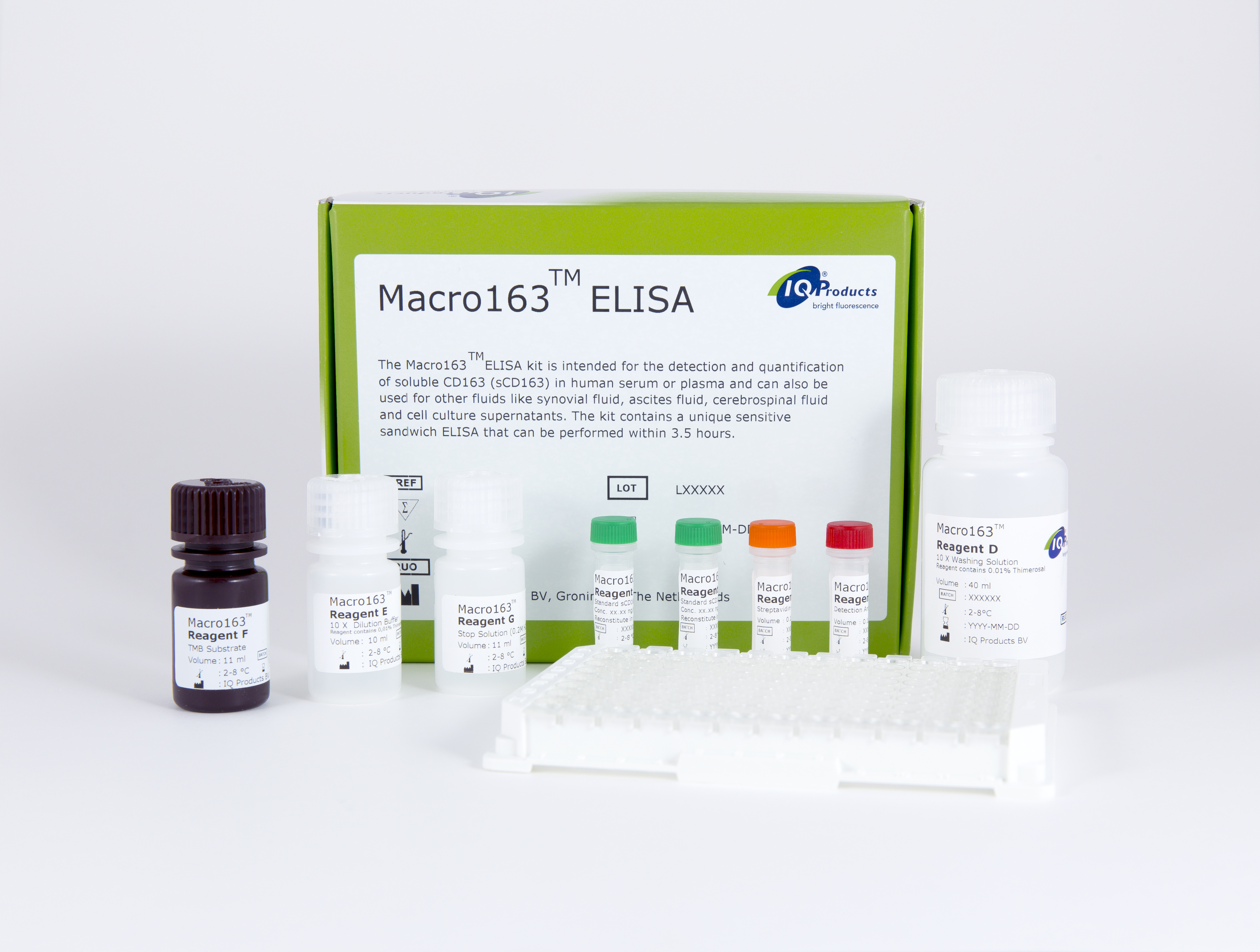Detection of inflammation and bacterial sepsis
Soluble CD163 ELISA assay for measuring Macrophage and Monocyte Activation
Unique features
- Analyse Macro163 levels in serum and plasma
- Complete ELISA kit
- Based on the two most published soluble CD163 ELISA protocols
- Assay completed within 4 hours
- Use of fully characterized recombinant CD163 protein as standard
- Standardized and quantitative
- Only 2 uL of sample is needed
- Pre-coated ELISA plates
Applications
- Detection and monitoring of macrophage activation syndromes
- Detection of myeloproliferative diseases and hemophagocytic syndrome
- Risk-marker in low-grade inflammatory states
- Prognostic marker in sepsis and liver-disease
- Monitoring of sepsis combined with leukocyte CD163 and CD64 expression
- Association with post-infectious recovery phase and declining inflammation
Introduction
CD163 is a membrane protein and member of the group B Scavenger Receptor Cysteine-Rich super family specifically expressed on peripheral blood monocytes and macrophages. A particularly high expression is seen in macrophages of the ‘alternative activation’ phenotype playing a major role in dampening the inflammatory response and in scavenging components of damaged cells.
CD163 functions as the receptor for Haptoglobin-hemoglobin complexes, and furthermore CD163 is involved in the regulation of inflammation.
Macrophages play a central role in the host response to infection and tissue damage, and are furthermore important in the pathogenesis of autoimmune diseases and cancer.
Measurement of sCD163 may be a valuable marker in diseases with macrophage and/or monocyte involvement, such as macrophage activation syndromes (e.g. hemophagocytic syndrome), infections, liver disease, auto-immune disease, atherosclerosis and cancer. Additionally, CD163 positive macrophages constitute a mayor cell subpopulation in human term placenta suggesting a role for the placenta functioning as an active immunosuppressive biological barrier between mother and fetus.
Principle of Macro163™
The assay is based on the principle of the sandwich ELISA. A polyclonal antibody recognizing CD163 is immobilized on the surface of a microtiterplate.
After incubation with the sample or recombinant CD163 standard a second biotinylated monoclonal antibody recognizing CD163 is added. Detection of the latter is done by adding streptavidin-HRP. Using TMB (3, 3’, 5, 5’-tetramethylbenzidine) as substrate for the enzyme HRP, the amount of sCD163 protein can be quantified.
Intended use
- This Macro163™ kit is intended for the quantification of soluble CD163 (sCD163) in serum or plasma samples.
- The Macro163™ assay has been validated for serum and plasma measurements but can also be applied to other biological fluids like synovial fluid, ascites fluid, pleural fluid, cerebrospinal fluid and cell-supernatants.
- Designed for research purposes only.
Research applications
- Detection and monitoring of macrophage activation syndromes (e.g. hemophagocytic syndrome)
(Schaer. Eur.J. Haematol 74: 6-10; 2005) - Prognostic marker in sepsis and liver-disease
(Weiss M. Crit Care Med. 34(10):2682-3; 2006) - Levels in the “high normal range” are strongly associated with increased risk (getting) diabetes in the following years
(Møller. Clinical Chemistry 57:2 291-297; 2011) - Soluble CD163 Made by Monocyte/Macrophages Is a Novel Marker of HIV Activity in Early and Chronic Infection Prior to and After Antiretroviral Therapy (Tricia H. Burdo, J Infect Dis. 2011;204:154–63)
